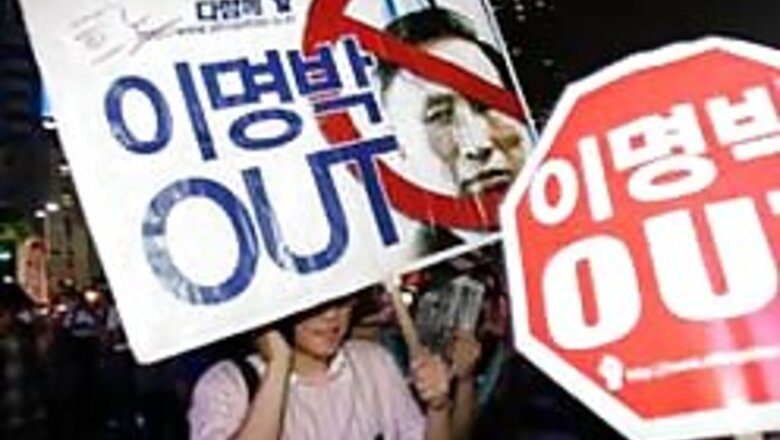
views
Seoul: Thousands of South Koreans kept up their protests on Friday against the government's plan to resume US beef imports, while the country's trade minister departed for Washington in an attempt to appease the demonstrators' demands.
Meanwhile, truckers went on strike to protest rising fuel prices in a fresh challenge for President Lee Myung-bak's young government.
In the latest of the anti-government rallies that have echoed through the streets of the capital for more than a month, about 10,000 demonstrators gathered on Friday in front of Seoul's City Hall, the police said.
Many carried candles at the protest, which coincided with the anniversary of the deaths of two schoolgirls in a 2002 accident with a US military vehicle.
That event had become a flashpoint for anti-American protests backed by liberal politicians in a presidential election year, helping them maintain the presidency by promising not to kowtow to Washington.
Lee's agreement to resume US beef imports in April just before a summit with President Bush was viewed by critics as caving in to American demands, stoking South Koreans' strong nationalist pride and accusations that he failed to seek a public consensus over health concerns.
"I think South Korea is a colony of the United States," Shin Jung-ah, a third-year high school student, said in a speech to the protesters.
Referring to the dead schoolgirls, she said, "We will make efforts to change the situation where both of you died unfairly. I hope you support us from the heavens."
Protesters chanted back, "Punish US murderer soldiers," and called for changes in the agreement governing American forces' presence in South Korea. Some 28,500 US troops remain deployed in South Korea in a legacy of the Korean War, which ended in 1953 with a cease-fire that has never been replaced by a peace treaty.
Protest organizers said they will intensify their rallies after next Friday if the government fails to agree to completely renegotiate the beef agreement.
"I want Lee Myung-bak to resign now. He's not qualified to be our president because he has unilaterally decided to import US beef without thinking about people's health," said Kim Kwang-ho, a cook at a Japanese restaurant who attended Friday's rally.
Other protesters laid white flowers on a table in front of portraits of the girls killed in 2002. A banner proclaimed that their "dreams were crushed by a US armored vehicle."
The recent protests began with high school students but have since drawn a wide range of left-leaning groups opposed to Lee's conservative policies.
Meanwhile, about 900 conservatives demonstrated at two TV stations against coverage that they claimed had encouraged the anti-government protests, police said.
Trade Minister Kim Jong-hoon traveled to Washington and was scheduled to meet Trade Representative Susan Schwab later Friday to discuss a proposal for US beef producers to voluntarily agree not to ship meat from cattle older than 30 months, which are believed to be more susceptible to mad cow disease.
South Korea was the third-largest overseas market for US beef until it banned imports after a case of mad cow disease was detected in 2003, the first of three confirmed cases in the United States.
Meanwhile in another headache for Lee, who took office in February, more than 13,000 unionized truck drivers stopped working early on Friday to protest surging oil prices.
The strike was expected to cripple operations in South Korean ports and cause massive losses to exporters. The government said it planned to dispatch 100 military trucks and use trains to help transport cargo during the strike.




















Comments
0 comment